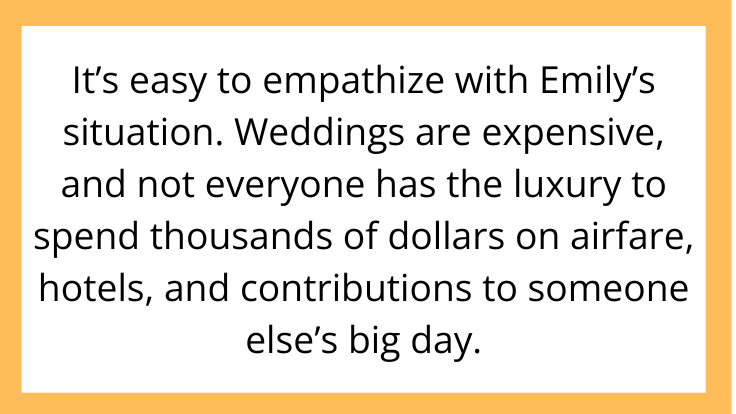AITAH for Refusing to Pay for My Sister’s Destination Wedding While She Calls Me Selfish?
When it comes to family weddings, emotions can run high—especially when expectations clash with reality. In today’s AITAH scenario, we’re diving into a real story of a sibling conflict that erupted over a lavish destination wedding and one sister’s refusal to foot the bill.
Let’s unpack what happened and why the internet is so divided.
The Backstory: The Dream Wedding That Sparked a Feud

A 32-year-old woman—let’s call her Emily—shared her dilemma on the r/AITAH subreddit. Emily’s younger sister, Sarah, recently got engaged and decided she wanted her wedding to be “an unforgettable experience.” Her plan? A week-long celebration at an exclusive resort in Bali.
Sarah insisted that close family—including Emily and her husband—attend. But she also expected something more: financial contributions to cover the venue and travel costs. According to Sarah, this was only fair because “family should invest in each other’s happiness.”
Emily was stunned. She and her husband had just bought their first home and were budgeting carefully to pay down debt and save for the future. When she explained that they couldn’t afford to help fund the wedding—or spend thousands to attend—Sarah accused her of being selfish and unsupportive.
Sarah’s words were harsh: “If you cared about me, you’d find a way to be there. I’d do it for you.”
Feeling guilty and confused, Emily turned to Reddit: Am I the villain for refusing to pay for my sister’s dream wedding?
The Case for Emily: Financial Boundaries Are Valid

It’s easy to empathize with Emily’s situation. Weddings are expensive, and not everyone has the luxury to spend thousands of dollars on airfare, hotels, and contributions to someone else’s big day.
Emily worked hard to create stability for her own family, and she has every right to prioritize her needs over a destination wedding she didn’t choose.
Many Reddit users pointed out that Sarah’s expectations were unreasonable. One top comment read, “It’s her wedding, her choice, her responsibility to pay for it.” Another user added, “If you can’t afford your own wedding, don’t plan one you expect others to fund.”
The Case for Sarah: Family Should Show Up

From Sarah’s perspective, her wedding was a once-in-a-lifetime celebration. She envisioned all the people she loved gathered together to witness her vows.
She likely felt hurt that her sister didn’t see this as important enough to stretch their budget or make sacrifices. In some families, pooling money to fund a big event is common practice—and not contributing can feel like a rejection.
Still, that doesn’t make it fair to pressure others into spending beyond their means.
When Guilt Trips Become Manipulation

Many commenters flagged Sarah’s comments as emotional manipulation. Saying, “If you loved me, you’d pay” is a guilt tactic—one that can damage relationships in the long run.
Healthy relationships are built on respect for each other’s boundaries, not shaming or coercion. As one Redditor put it, “Love doesn’t mean draining your savings account.”
The Bigger Question: Are Destination Weddings Exclusionary?

This story also shines a spotlight on a broader debate. Destination weddings can be beautiful, but they are often cost-prohibitive for guests.
When a couple plans an expensive event far from home, they are—intentionally or not—creating barriers to participation. While that’s their choice, it’s not fair to blame others who can’t make it work financially.
What Emily Could Do Next

Here are a few ways Emily might navigate the conflict:
-
Offer Non-Financial Support: She could help with planning, create wedding favors, or offer her skills instead of money.
-
Attend Part of the Event: If attending the whole week is too expensive, maybe she can go for just the ceremony.
-
Set Clear Boundaries: Calmly but firmly explain her financial situation again and affirm her love for her sister without agreeing to pay.
Ultimately, Emily doesn’t owe anyone an apology for living within her means.
The Verdict: Not the Villain

In the end, most of Reddit agreed: Emily was not the villain here. Setting boundaries about money is not selfish—it’s responsible.
It’s okay to say no when something exceeds your financial comfort zone, no matter how much you love someone.



